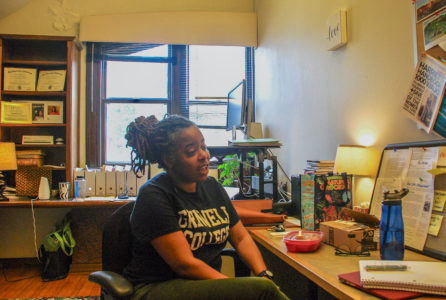By Esther Hwang
hwangest@grinnell.edu
Communities are responding to sexual assault with a fire hotter than ever this year. The National Sexual Violence Resource Center is leading Sexual Assault Awareness Month with the campaign theme “I Ask,” championing the message that asking for consent is a healthy part of everyday interactions.
Perhaps you first thought about consent from trainings in New Student Orientation, led by Jen Jacobsen ’95, director of wellness and prevention and Title IX deputy for prevention. Or perhaps you were exposed to the concept on the Internet or in sex-education programs prior to attending the College. Changing norms around consent is a major step in the right direction to legally protect survivors of sexual assault and to teach the next generation how to communicate desires and boundaries.
Before the concept of affirmative consent, led by Antioch College in 1990, questions around sexual assault often veered into accusatory questions to the survivor, questions like “But did you say no?” Grinnell College was praised for implementing its own affirmative consent standard in 2012, requiring a verbal and willing “yes” in sexual activities. Yet there are many issues around definitions of rape that have limited Grinnell’s ability to protect survivors.
Tyler Kingkade’s 2015 Huffington Post article, “Why Even Small Progressive Grinnell College Has Trouble Dealing With Sexual Assault on Campus,” reported on a male student accused of sexual assault and who was charged with sexual misconduct on the evidence of text messages, pictures of bruising and what the survivor believed to be a confession from the accused. Yet he was not found guilty for rape, and his punishment for “nonconsensual penetrative intercourse” was limited to conduct probation.
The most disturbing passage from Kingkade’s article was a quote from the accused, which illustrates the failure of the college to align its affirmative consent standards with formal definitions of rape: “If the school really thought that I was guilty of this, I shouldn’t be here; if my case was as serious as Anna made it out to be, I shouldn’t be here right now,” he said, adding, “I’m grateful it hasn’t changed my views on how I saw rape — I’m not questioning every single woman that said that it happens to them.”
The perpetrator did not believe he has committed an act of violence, and the College’s decision to find him not guilty of rape confirmed his views that he did nothing wrong. The accused in this 2012 case was allowed to remain enrolled in school and continue to engage in harmful behaviors. In other cases covered by Kingkade, survivors were placed on academic suspension while the perpetrator was allowed to stay. In most cases, Grinnell College issues no-contact orders in an attempt to remedy the hostile environment.
The practicality of these no-contact orders has been criticized by many, including administrators of the College, because of the small size of campus. Michelle Risacher ’17, co-founder of Dissenting Voices, spoke on the issue of when your rapist is on campus or in the same classes as you: “Title IX is all about equal opportunity to education. And it’s like, you’re constantly … re-experiencing your trauma in a classroom, how can you be expected to have the same opportunity to learn?”
Dissenting Voices, a feminist group created to hold the Title IX office accountable for protecting survivors of sexual assault, has highlighted fallacies in Title IX policy from the experiences of survivors themselves. Dissenting Voices has pushed the administration to make concrete policy changes that prioritize the mental and emotional wellbeing of the survivor over the perpetrators. These policy changes include providing leniency in academic standing considerations for survivors, establishing a culturally-sensitive point person for international and undocumented students, implementing the option of exit interviews for students who have gone through conduct hearings, forbidding the inclusion of discriminatory information in official investigation reports and defining minimum outcomes for each type of sexual violation the College recognizes, among many others.
From the perspective of current faculty, there are simple changes that can be made to facilitate professors’ ability to support their students. Assistant Professor Stephanie Jones, education, called on her experience in high school education to propose a system for professors to come together to support a student struggling through personal issues.
“If I noticed something going on with a student in my class, it should not be difficult to find out who else they are taking [courses with] on campus. I don’t see that information unless you’re my advisee. I don’t know what other professors you have. But if I could email those professors and have us get in a room and figure out how to support you if you’re going through something, kind of like a collective family approach, right? To be like we’re all here to support you, you don’t have to go one by one and figure this out,” she said.
In the history of sexual assault cases, men’s rights activists have upheld an accused person’s rights to a due process hearing. This has been demonstrated in the hours-long hearing of Supreme Court Justice Brett Kavanaugh and his ability to walk away from his accusation due to a lack of evidence beyond a reasonable doubt. Colleges have lower evidentiary standards to expel a student than federal courts to imprison a defendant. This makes sense, because the impacts of expulsion from college are exponentially less severe than a criminal record. On a campus as small as Grinnell, this means we have to take seriously the recommendation to expel perpetrators of violence or suspend them until the survivor graduates.
Due process hearings give accused perpetrators a chance to tell their side of the story. Perhaps our society needs to shift away from prioritizing both sides of the story equally and instead recognize that there are power dynamics affecting whose story will be believed.
“There’s still this stereotype of ‘he said/she said,’ regardless of the gender of the two people involved, of like, oh there’s one story and then there’s another story and we’ll never know whose story is fact. But the fact is that one story is always privileged, and most perpetrators are men. … Systemically and historically we’re always going to privilege the man’s story,” Risacher said.

























































